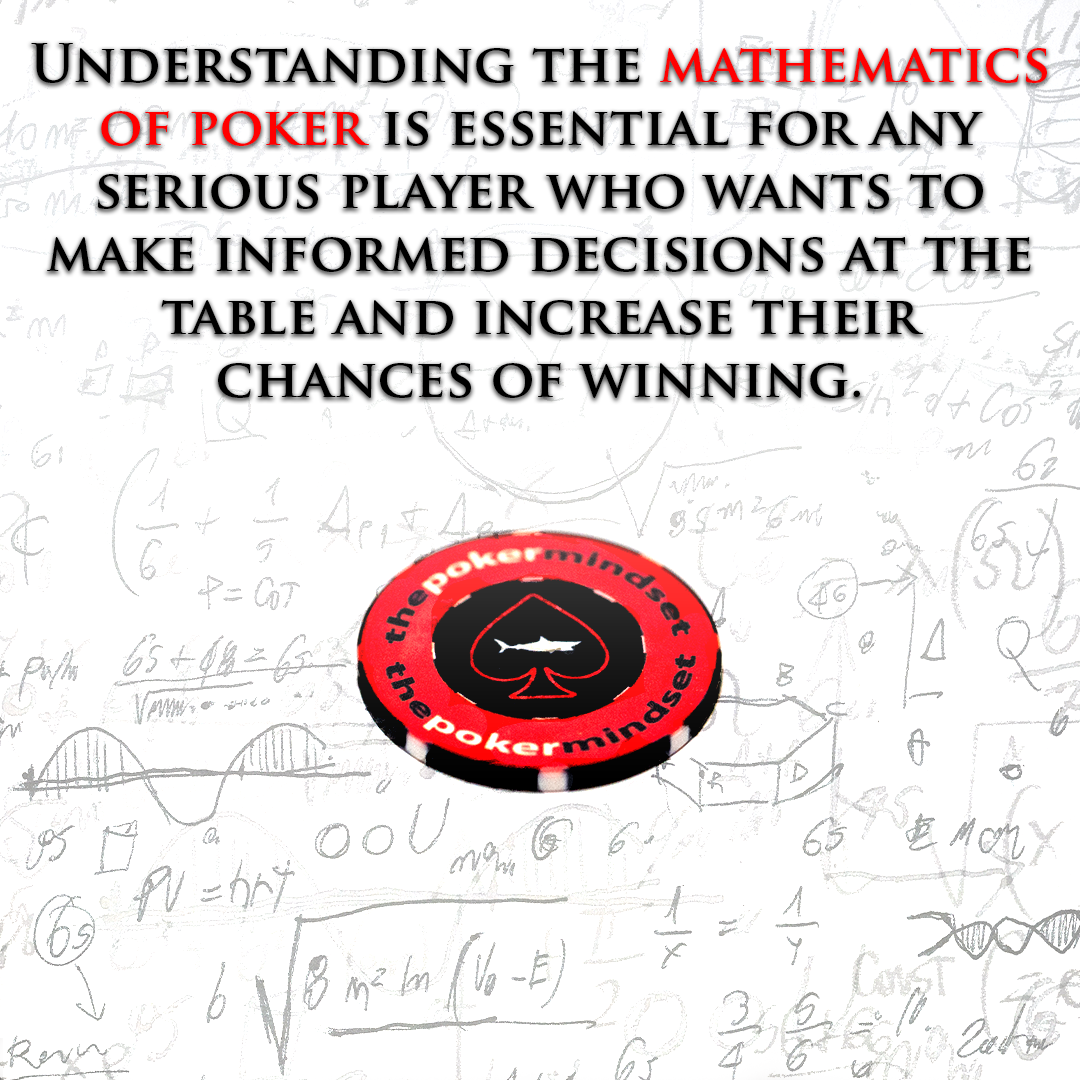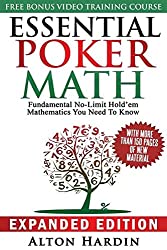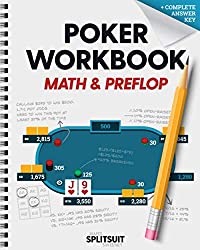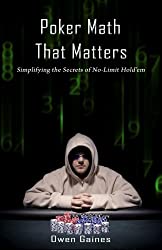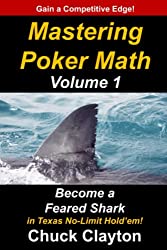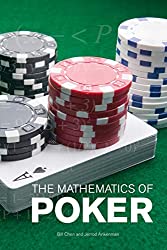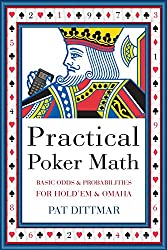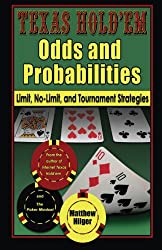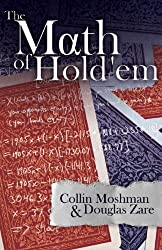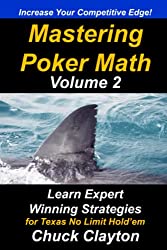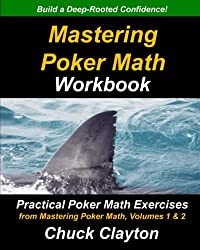“Poker players seeking to improve their games and strategic know-how necessarily comes up against the inescapable truth that understanding the fundamentals of poker math is essential. Knowing basic probabilities helps informed decisions regarding practically all aspects of poker, from starting hand selection to the narrowing of hand ranges when making a big river decision. Understanding other fundamentals like how to count outs, how to calculate pot odds (and implied odds), how to calculate expected value and the like, serves as a necessary foundation on top of which other winning skills can be developed.” (Martin Harris)
You can improve your chances of winning by mastering the math behind the game. In fact, understanding the mathematics of poker is essential for any serious player who wants to make informed decisions at the table and increase their chances of winning.
To help you get started, we’ve compiled a list of the top 10 books on poker math, odds, and probabilities. From beginner guides to advanced strategies, these books cover everything you need to know to boost your poker skills and increase your chances of winning. Whether you’re a seasoned pro or just starting out, these resources will give you the tools you need to succeed at the poker table.
Note: The links in this article are Amazon affiliate links, which means that if you click on them and make a purchase, I will receive a small commission, with no extra cost for you. This helps to support the cost of maintaining this website and creating new content. I appreciate your support and understanding. Thank you for considering purchasing through my links!
1. Essential Poker Math, Expanded Edition: Fundamental No Limit Hold’em Mathematics You Need To Know, by Alton Hardin
“Essential Poker Math, Expanded Edition: Fundamental No Limit Hold’em Mathematics You Need To Know” is a comprehensive guide to the math behind poker, specifically focusing on No-limit Hold’em. Written by Alton Hardin, a professional poker player and coach, this book is designed to help players of all levels improve their understanding of the math behind the game and make more informed and profitable decisions at the poker table.
In this book, the author aims to dispel this myth and show readers that fundamental poker math is easy to learn and can greatly improve their game. The book covers a range of concepts, including probabilities and odds, pot equity, pot odds, implied odds, the Rule of 2 and 4, expected value, and more. It also includes chapters on pre-flop and post-flop math, including all-in situations, set-mining, steal attempts, 3-bet bluffing, betting with the best hand, semi-bluffing all-in, bluffs, and hero calls. The book is suitable for both beginner and experienced players, and by the end, readers will have mastered essential No-limit Hold’em math and gained a significant skill advantage over their opponents.
What are you waiting for? Click here to purchase this book from Amazon today to start advancing your poker game with simple poker math!
2. Poker Workbook: Math & Preflop: Learn & Practice +EV Skills Between Sessions (The Practicing Poker Series) by James Sweeney
The Preflop & Math Poker Workbook is designed to help players improve their poker skills and increase their winnings at the table. The book focuses on the math that underlies all aspects of poker strategy, teaching readers the formulas and providing practice exercises to help them master key concepts such as equity, range building and hand reading, combos and blockers, pot odds, implied odds, breakeven percentages, and expected value.
The book includes examples from a variety of poker games, including live cash games and online tournaments, and is suitable for players of all levels. It also includes an answer key and links to additional software and spreadsheets to help readers practice and reinforce their learning.
Whether you’re a beginner looking to learn the basics of poker math or an experienced player seeking to refine your skills and optimize your edge at the table, the Preflop & Math Poker Workbook is an essential resource for improving your game and becoming a successful poker player.
No more excuses. No more confusion when it comes to the core poker math. And no more reasons for skipping another study session. Click here to pick up the Preflop & Math Poker Workbook and start seeing your strategy the right way.
3. Poker Math That Matters: Simplifying the Secrets of No-Limit Hold’em by Owen Gaines
In “Poker Math That Matters,” author Owen Gaines breaks down the complex math of No-limit Hold’em into easy-to-understand concepts and techniques, making it accessible to players of all levels.
The book begins with an overview of the basic math concepts that are essential to understanding No-limit Hold’em, including pot odds, expected value, and the likelihood of winning a hand. From there, it delves into more advanced topics such as exploiting your opponents’ mistakes, adjusting your strategy based on stack sizes, and maximizing your winnings in tournament play.
Throughout the book, Gaines presents real-world examples and hands to illustrate key concepts and help readers apply the math to their own play. He also includes interactive quizzes and exercises to test and reinforce learning.
Click here now to get the book from Amazon!
4. Mastering Poker Math: Become a Feared Shark in Texas No-Limit Hold’em by Chuck Clayton
“Mastering Poker Math Volume 1” begins with an introduction to foundational poker math concepts, including decision making with imperfect information, probabilities, fractions, odds, and counting outs. It then covers more advanced topics such as the Rule of 2 and 4, key percentages and probabilities, equity, and expected value.
In the second section of the book, readers will learn how to apply these concepts in practice, with chapters on selecting great starting hands, the power of betting, and the core math of tournament play. The third section delves into the specific applications of poker math, with chapters on chip management, bluffing, pocket pairs, decision tree analysis, all-in situations, and more.
The final section of the book focuses on becoming a new breed of poker player, with chapters on game theory optimal play, strengthening your skills, tracking your results, and next steps.
Mastering Poker Math Volume 1 is packed with powerful information to help you gain a strong competitive edge and prepare yourself to play excellent tournament poker. Get your copy today and start becoming a feared shark at the tables!
5. The Mathematics of Poker by Bill Chen and Jerrod Ankenman
In the late 1970s and early 1980s, the bond an option markets were dominated by traders who had learned their craft by experience. They believed that their experience and intuition for trading were a renewable edge; this is, that they could make money just as they always had by continuing to trade as they always had. By the mid-1990s, a revolution in trading had occurred; the old school grizzled traders had been replaced by a new breed of quantitative analysts, applying mathematics to the “art” of trading and making of it a science. Similarly in poker, for decades, the highest level of pokers has been dominated by players who have learned the game by playing it, “road gamblers” who have cultivated intuition for the game and are adept at reading other players’ hands from betting patterns and physical tells. Over the last five to ten years, a whole new breed has risen to prominence within the poker community. Applying the tools of computer science and mathematics to poker and sharing the information across the Internet, these players have challenged many of the assumptions that underlie traditional approaches to the game. One of the most important features of this new approach is a reliance on quantitative analysis and the application of mathematics to the game. The intent of this book is to provide an introduction to quantitative techniques as applied to poker and to a branch of mathematics that is particularly applicable to poker, game theory. There are mathematical techniques that can be applied for poker that are difficult and complex. But most of the mathematics of poker is really not terribly difficult, and the authors have sought to make seemingly difficult topics accessible to players without a very strong mathematical background.
Click here now to get the book from Amazon!
6. Practical Poker Math: Basic Odds And Probabilities for Hold’Em and Omaha by Pat Dittmar
What are the odds of winning at poker if you don’t know the odds in poker? Practical Poker Math provides a complete and easy-to-understand explanation of the basic odds, probabilities and expectations in Hold’Em and Omaha (Omaha Hi-Low). All the formulations are completely open and are demonstrated via easy-to-follow, color-coded calculations. Pat Dittmar has aimed this book at beginning through semi-pro players who want to improve their results and who know that there is not much chance of improvement without a fundamental understanding of poker odds, probabilities, and expectations. Pat Dittmar is head of trading and development at TradePointTechnologies.com, an organization that develops and deploys state-of-the-art proprietary trading technologies. Pat feels that successful poker players possess the skills required to play in the one true fast action, around the world, around the clock “Big Game” ― the world financials markets, and TradePointTechnologies recruits its traders exclusively from the poker world.
Click here to buy the book from Amazon!
7. Texas Hold’em Odds and Probabilities by Matthew Hilger
– How often does each starting hand win against a specific hand or random hand? – What are the odds of your opponent holding a pocket pair when he raises? – What is the probability that an over-card will flop when you hold JJ? – How do you determine if drawing is profitable or not? Texas Hold’em Odds and Probabilities answers all of these questions and more. Every single decision you make at the poker table is in some way related to odds and probabilities. Whether you are deciding to bet, call, fold, raise, or even bluff, odds and probabilities are an integral part of the decision-making process. Texas Hold’em Odds and Probabilities does more than just show you how to calculate the odds – more importantly, the focus is on how to apply odds to make better decisions. Hilger’s approach shows that you do not need to be a math wiz to be successful in poker. Simple concepts and strategies that anyone can learn will have you matching wits with the top players in no time. Some of the topics include: raising draws for value, backdoor draws, facing all-in decisions before the flop, protecting your hand, the impact of stack sizes, and much more. In addition, the most comprehensive collection of Texas Hold’em charts and statistics ever put in print is provided as reference. Poker is a fun game, but it is even more fun when you win. Expert players understand the simple math behind every decision they make – now you can too.
Click here now to get the book from Amazon!
8. The Math of Hold’em, by Collin Moshman and Douglas Zare
Winning big at Hold’em requires practical math knowledge, which is precisely what this book will teach you. The ability to make quick and accurate mathematical decisions is crucial for your winnings at the table. The mission of this book is to drill these important poker math skills into you, giving you a distinct advantage over the other players at your table.
Both of the authors of this book graduated with degrees in Mathematics from Caltech. Collin Moshman is the best-selling author of Sit ‘n Go Strategy and Heads-Up No-Limit Hold’em. Douglas Zare is a mathematician and poker coach famous for his in-depth analyses.
The authors use their extensive math, poker, and coaching backgrounds to present the most important Hold’em math concepts designed to immediately increase your win-rate at the tables.
You will learn to:
- Understand the fundamental probabilities and statistics underlying Hold’em
- Count hand combinations while playing
- Master expected value calculations
- Play optimally with game theory
- Seize full advantage of the latest software
- Utilize deductive logic to put your opponent on a specific hand range
- And more…
Click here to buy the book from Amazon!
9. Mastering Poker Math: Learn Expert Winning Strategies for Texas No-Limit Hold’em by Chuck Clayton
“Mastering Poker Math Volume 2” is a sequel to “Mastering Poker Math Volume 1” and is designed for intermediate to advanced poker players. It covers advanced topics in the math and strategy of Texas no-limit hold’em and teaches players how to integrate this knowledge into their overall game.
The book is divided into seven sections and includes chapters on essential poker math probabilities, starting hand range probabilities, poker equity theory, range analysis, trapping, disciplined folding, and the metagame. It also includes chapters on developing higher level skills, plugging leaks, and moving forward as a player.
Throughout the book, readers will learn how to estimate the worth of their hand and their opponents’ hands, make excellent risk assessments, and think more strategically at the poker tables.
Get your copy today and increase your competitive edge in tournament poker!
10. Mastering Poker Math Workbook: Practical Poker Math Exercises from Mastering Poker Math, Volumes 1 & 2 by Chuck Clayton
The Mastering Poker Math Workbook is a comprehensive study guide for intermediate to advanced poker players. It is designed to strengthen players’ knowledge of poker math, build deep-rooted confidence in their abilities, and provide practical exercises for applying the concepts learned in Mastering Poker Math Volumes 1 and 2. The workbook covers fundamental poker knowledge, key probabilities, situational awareness exercises, assessments, and a final review. It also includes an answer key. The material is primarily geared towards tournament play, but many of the concepts can also be applied to cash games. The workbook is flexible and allows players to go through chapters sequentially or cherry-pick the exercises that interest them most.
Click here to check out the book on Amazon!
Note: Click here to read our short guide on how to calculate pot odds and equity in poker. You’ll also get a simple outs and equity cheat sheet!
We have compiled a list of the best online poker sites with the most generous sign-up bonuses, smoothest software and softest games. Click here to check it out!


